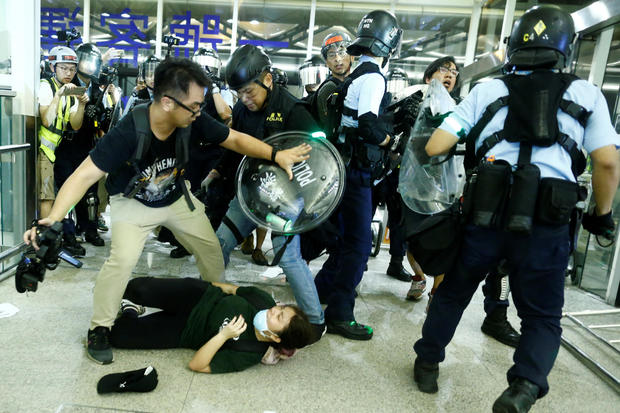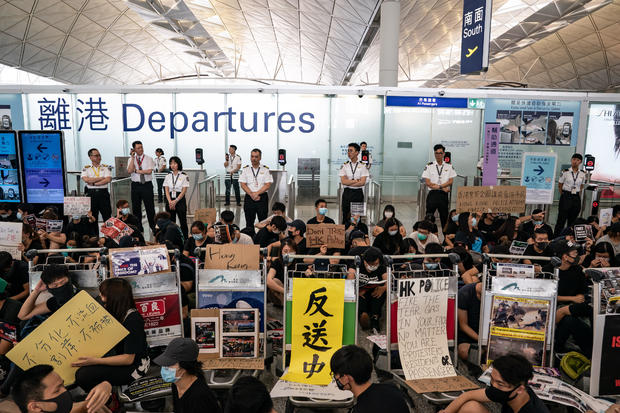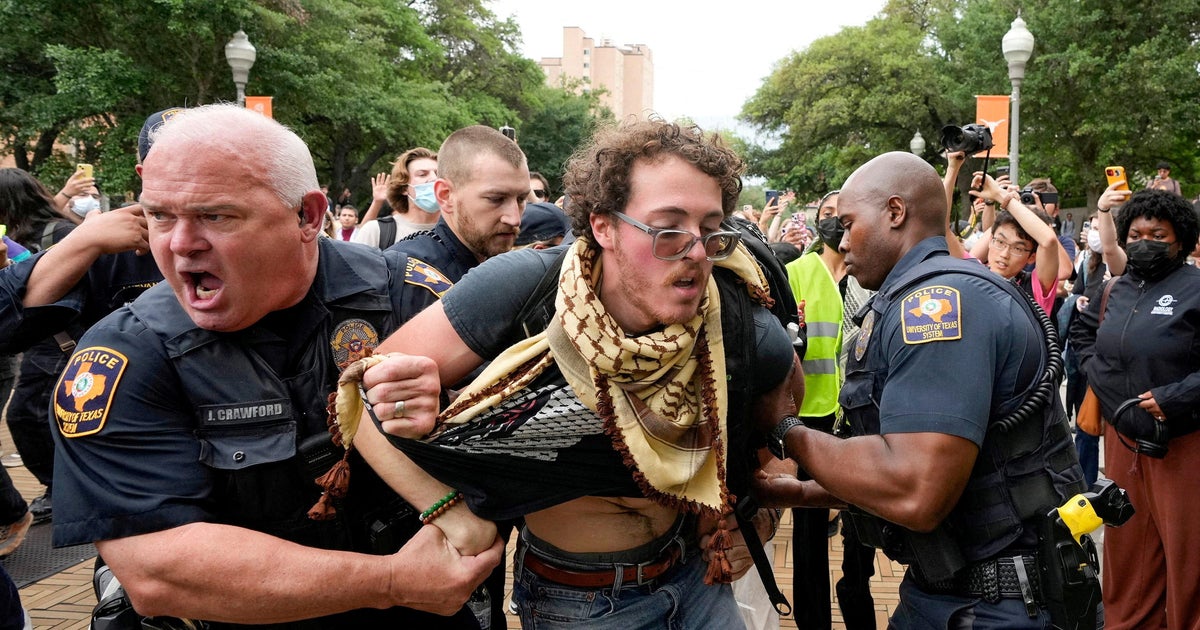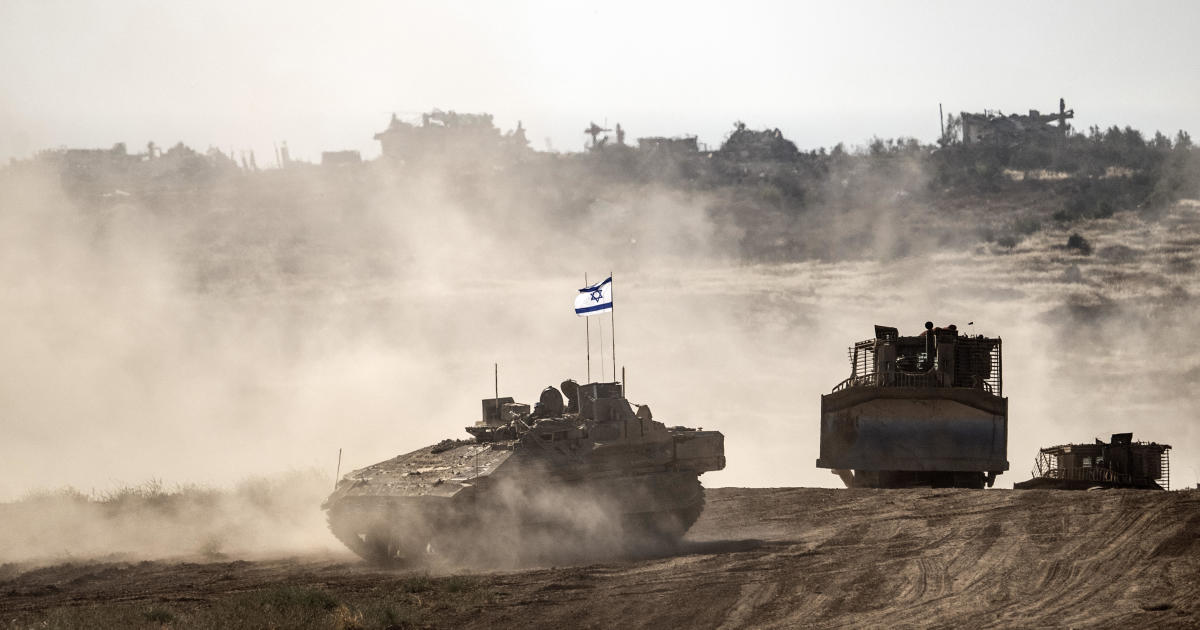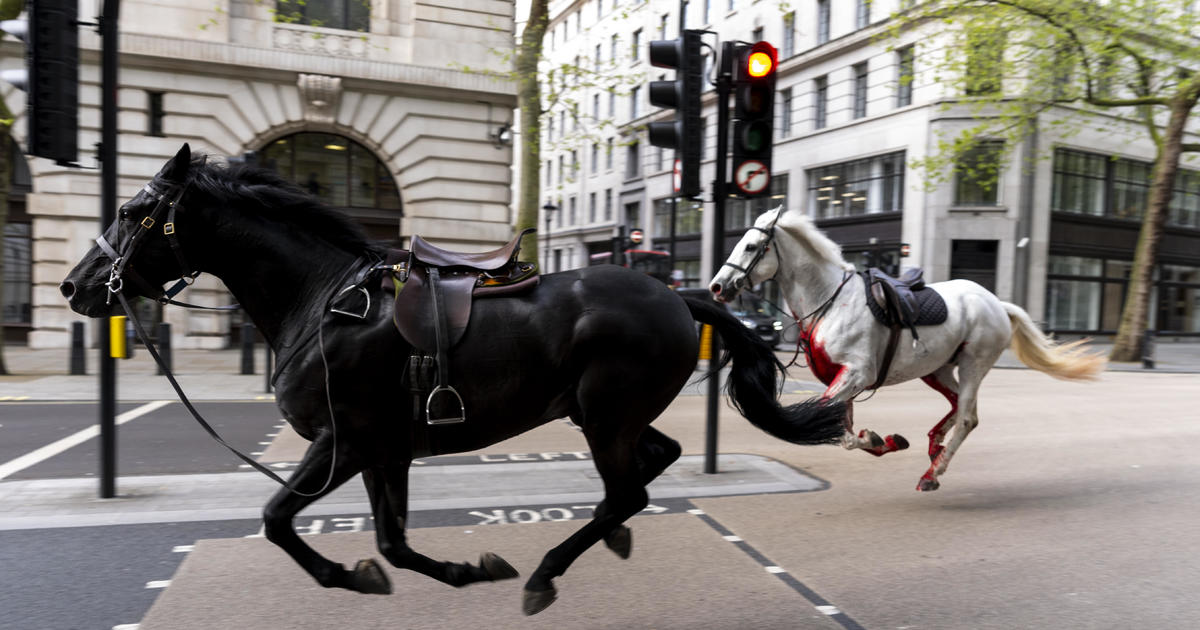Riot police clash with protesters at Hong Kong airport as Chinese forces mass at border
Hong Kong — Riot police clashed with pro-democracy protesters at Hong Kong's airport late Tuesday night, moving into the terminal where the demonstrators had shut down operations at one of the world's busiest transport hubs for two straight days. Officers armed with pepper spray and swinging batons confronted the protesters who used luggage carts to barricade entrances to the airport terminal.
Police took several people into a police van waiting at the entrance to the airport's arrivals hall. Police said they tried to help ambulance officers reach an injured man whom protesters had detained on suspicion of being an undercover agent.
Protesters also detained a second man who they suspected of being an undercover agent. After emptying out his belongings, they found a blue T-shirt that has been worn by pro-Beijing supporters that they said was evidence he was a spy.
CBS News producer Chris Liable said all scheduled flights not already checked in were cancelled, and protesters were also blocking the departure lines at immigration, so nobody was able to get through there — something the protesters hadn't done previously.
The city's pro-Beijing leader warned that the protesters had pushed events onto a "path of no return."
After a brief period early in the day when flights were able to take off and land, the airport authority suspended check-in services for departing flights as of 4:30 p.m. Departing flights that had completed the process would continue to operate.
It said it did not expect arriving flights to be affected, although dozens were already canceled. The authority advised people not to come to the airport, one of the world's busiest transport hubs.
More than 200 flights were canceled Monday and the airport was effectively shut down with no flights taking off or landing. Passengers have been forced to stay in the city while airlines struggle to find other ways to get them to their destinations.
For Grace Bendal, a 43-year-old contractor from the Philippines, Tuesday was the second straight day she came to the airport only to learn flights were canceled. She spent the weekend in Hong Kong with her primary school-age children, who were eager to return to classes.
She said they have already missed two days of school and the extra day in the city has cost her around 3,000 Hong Kong dollars ($400). Though there were no airline employees at check-in counters Tuesday evening, Bendal said she and her children planned to stay at the airport all night.
"I cannot blame them, because they are fighting for something," Bendal said of the protesters. "But then it's not right if we are the ones suffering. So I hope they give us a chance to go home."
The airport disruptions are an escalation of a summer of demonstrations aimed at what many Hong Kong residents see as an increasing erosion of the freedoms they were promised in 1997 when Communist Party-ruled mainland China took over what had been a British colony.
The protests have built on an opposition movement that shut down much of the city for seven weeks in 2014 before it eventually fizzled and its leaders were jailed on public disturbance charges.
An "existential threat"?
The central government in Beijing ominously characterized the protest movement as something approaching "terrorism" that posed an "existential threat" to the local citizenry.
Meanwhile, paramilitary police were assembling across the border in the city of Shenzhen for exercises in what some saw as a threat to increase force brought against the mostly young protesters who have turned out in their thousands over the past 10 weeks.
Hong Kong leader Carrie Lam said the ongoing instability, chaos and violence have placed the city on a "path of no return."
The demonstrators have shown no sign of letting up on their campaign to force Lam's administration to respond to their demands, including that she step down and entirely scrap legislation that could have seen criminal suspects sent to mainland China to face torture and unfair or politically charged trials.
While Beijing tends to define terrorism broadly, extending it especially to nonviolent movements opposing government policies in minority regions such as Tibet and Xinjiang, the government's usage of the term in relation to Hong Kong raised the prospect of greater violence and the possible suspension of legal rights for those detained.
While China has yet to threaten sending in the army -- as it did against pro-democracy protesters in Beijing in 1989 -- the exercises in Shenzhen were a further demonstration of its ability to crush the demonstrations, even at the cost to Hong Kong's reputation as a safe haven for business and international exchange.
Images posted online showed armored personnel carriers belonging to the People's Armed Police driving in convoy Monday toward the location of the exercises, just across the border from Hong Kong.
The People's Liberation Army also has a garrison in Hong Kong, which recently released a video showing its units combating actors dressed as protesters. The Hong Kong police on Monday also put on a display of armored car-mounted water cannons that it plans to deploy by the middle of the month.
"Credible evidence" of police violations
Demonstrators have in recent days focused on their demand for an independent inquiry into what they call the police's abuse of power and negligence. That followed reports and circulating video footage of violent arrests and injuries sustained by protesters.
On Tuesday, United Nations human rights chief Michelle Bachelet urged Kong Kong authorities to investigate what she called "credible evidence" suggesting law enforcement officers had fired tear gas at protesters in ways that violate international law. Videos have emerged showing police firing gas and beanbag rounds at close range.
Some protesters have thrown bricks, eggs and flaming objects at police stations and police said they arrested another 149 demonstrators over the weekend, bringing the total to more than 700 since early June. Police say several officers have suffered burns, bruises and eye damage inflicted by protesters.
Lam told reporters Tuesday that dialogue would only begin when the violence stopped. She reiterated her support for the police and said they have had to make on-the-spot decisions under difficult circumstances, using "the lowest level of force."
"After the violence has been stopped, and the chaotic situation that we are seeing could subside," Lam said, "I as the chief executive will be responsible to rebuild Hong Kong's economy ... to help Hong Kong to move on."
She did not elaborate on what steps her government will take toward reconciliation. After two months, the protests have become increasingly divisive and prompted clashes across the city.
Hong Kong hit where it hurts
The airport shutdown added to what authorities say is already a major blow to the financial hub's crucial tourism industry.
Kerry Dickinson, a traveler from South Africa, said she had trouble getting her luggage Tuesday morning.
"I don't think I will ever fly to Hong Kong again," she said.
The protests early on were staged in specific neighborhoods near government offices. However, the airport protest was had a direct impact on business travel and tourism. Analysts said it could make foreign investors think twice about setting up shop in Hong Kong, which has long prided itself as being Asia's leading business city with convenient air links across the region.
The black-clad protesters Tuesday held up signs in Simplified Chinese and English to appeal to travelers from mainland China and other parts of the world. "Democracy is a good thing," said one sign in Simplified Chinese characters, which are used in mainland China instead of the Traditional Chinese script of Hong Kong.
Adding to the protesters' anger, Hong Kong's Cathay Pacific Airways told employees in a memo that the carrier has a "zero tolerance" for employees joining "illegal protests" and warned violators could be fired.
Hong Kong was promised democratic rights not enjoyed in Communist Party-ruled mainland China when Beijing took over what had been a British colony in 1997, but some have accused Beijing of steadily eroding their freedoms. Those doubts are fueling the protests, which build on a previous opposition movement that shut down much of the city for seven weeks in 2014 that eventually fizzled out and whose leaders have been imprisoned.
